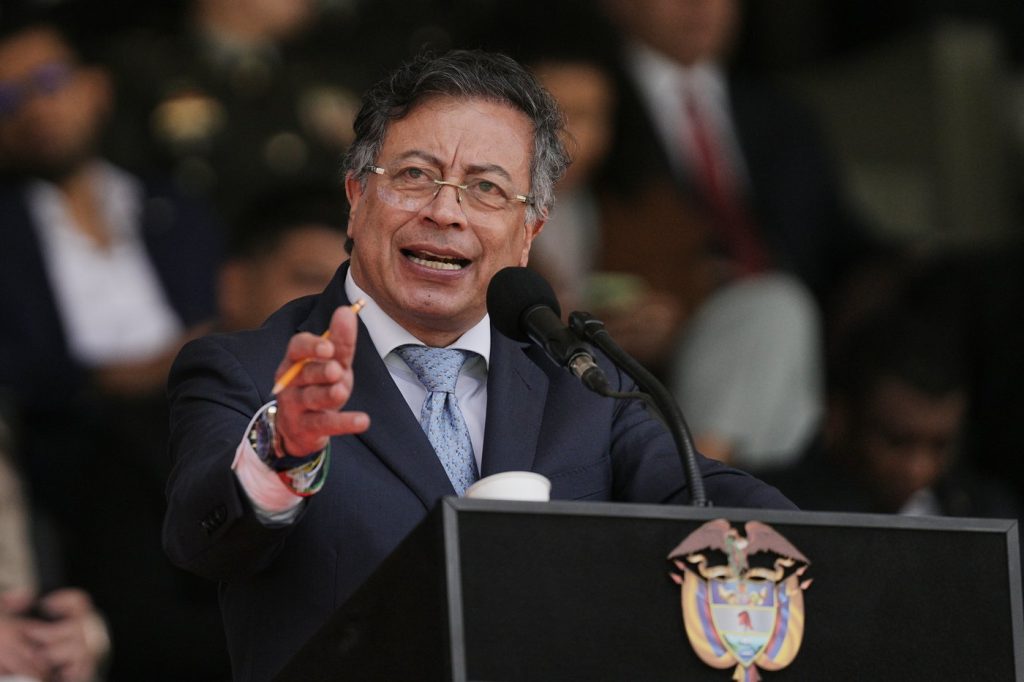BOGOTA, Colombia (AP) — Colombian President Gustavo Petro has ordered the nation’s security forces to halt all intelligence sharing with the United States until the Trump administration ceases its military strikes against suspected drug traffickers in the Caribbean. This directive comes amidst increasing tensions between Colombia and the U.S., which had previously enjoyed close collaboration in combating drug trafficking.
In a post on X, Petro emphasized that Colombia’s military must immediately end “communications and other agreements with U.S. security agencies” in response to what he described as extrajudicial executions of individuals believed to be involved in drug trafficking. He asserted that the fight against drugs should prioritize the human rights of the Caribbean population, though the specifics of the intelligence that will no longer be shared remain unclear. As of now, there has been no immediate comment from the White House regarding Petro’s statements.
According to data provided by the Trump administration, at least 75 individuals have been killed in U.S. military strikes in international waters since August. The targeted operations, which began in the southern Caribbean near Venezuela’s coastline, have subsequently expanded to the eastern Pacific, with the U.S. targeting boats offshore from Mexico.
President Petro has called for an investigation into U.S. President Donald Trump for potential war crimes due to these strikes, which reportedly impact citizens from Venezuela, Ecuador, Colombia, and Trinidad and Tobago. He criticized U.S. drug policies, arguing that they unjustly target poor Colombian farmers growing coca, the fundamental ingredient for cocaine production, rather than focusing on high-level drug traffickers and money laundering operations. Recently, Petro met with the family of a Colombian fisherman who was allegedly killed in one of these U.S. strikes, emphasizing the unjust nature of such actions.
“He may have been carrying fish, or he may have been carrying cocaine, but he had not been sentenced to death,” Petro remarked at a summit of Latin American and European Union leaders hosted in Colombia. The Trump administration, however, has rebuked Petro, accusing him of being lenient toward drug traffickers and criticizing his decision to withhold extradition for certain Colombian rebel leaders involved in drug-related activities.
In October, the Trump administration imposed financial sanctions on President Petro and some members of his family, citing allegations of their involvement in the international drug trade. U.S. Treasury Secretary Scott Bessent stated that Petro “has allowed drug cartels to flourish and refused to stop this activity,” insisting that the U.S. will remain steadfast in combating drug trafficking.
The rising tensions between the U.S. and Colombia occur concurrently with an increase in U.S. naval presence in the southern Caribbean. The U.S. has deployed eight warships, a submarine, fighter jets, and marines, with the aircraft carrier USS Gerald Ford expected to arrive in the region shortly. Venezuela’s government has condemned this naval buildup as a threat to its sovereignty, asserting that the U.S. military might be preparing strikes against the administration of President Nicolas Maduro.
The Trump administration has justified its military deployment as a measure against drug traffickers, although President Trump has suggested that there may be military actions targeting Venezuela, whose leadership has been accused of drug trafficking. Venezuelan Defense Minister Vladimir Padrino López announced that military personnel, along with members of a civilian militia and police, would participate in a training exercise aimed at defending the country’s airspace, signaling Venezuela’s preparedness in the face of the heightened U.S. military activity.











